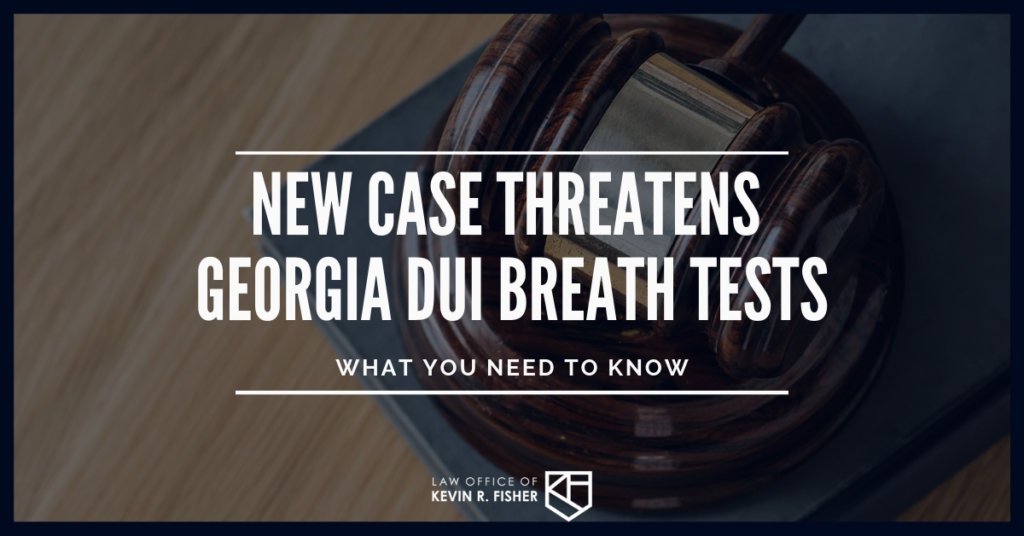Yesterday, with Elliott v. State, the Georgia Supreme Court handed down a decision that has major implications for Georgia drivers and the attorneys who represent them, particularly where breath tests are involved.
To understand the implications of this case, it is first important to understand a little bit of Georgia law, and even a bit of constitutional jurisprudence, so stay tuned for your Constitutional Law lecture of the day! But let’s start with the relevant Georgia law. Essentially, when a driver is arrested under suspicion of DUI, the arresting officer is supposed to read what is called an Implied Consent Warning (you can read my detailed analysis of the Implied Consent law here). The part that is relevant for purposes
 of this case reads:
of this case reads:
Georgia law requires you to submit to state administered chemical tests of your blood, breath, urine, or other bodily substances for the purpose of determining if you are under the influence of alcohol or drugs. If you refuse this testing, your Georgia driver’s license or privilege to drive on the highways of this state will be suspended for a minimum period of one year. Your refusal to submit to the required testing may be offered into evidence against you at trial.
The main question in this case is whether the last line violates Article 1, Section 1, Paragraph XVI of the Georgia Constitution, which states that “no person shall be compelled to give testimony tending in any manner to be self-incriminating.”
“But,” you might be thinking, “how is a breath test considered to be testimony…?”
“…Isn’t it just blowing into a box? You don’t have to make any statements to blow into a box!” The answer is yes, you’re right. But in another case from 2017, Olevik v. State, the Georgia Supreme Court held that a breath test is incriminating in nature and, therefore, the State is prohibited from compelling such a test. Olevik v. State, 302 Ga. 228 (2017). In Olevik, the Supreme Court examined the common understanding of the word “testimony” at the time of the passage of the 1877 Georgia Constitution, which was the first Georgia Constitution to codify any kind of protection against self-incrimination. In the Court’s view, the 1877 understanding of the word “testimony” included affirmative acts (such as blowing into a box) as well as verbal testimony. It therefore found the breath test to be “testimony.” (Incidentally, this method of constitutional interpretation is a matter of a great deal of debate.)
Interestingly, this conclusion conflicts with current U.S. Supreme Court jurisprudence relating to the Fifth Amendment to the U.S. Constitution, which is very similar to Paragraph XVI of the Georgia Constitution that is at issue in this case. The U.S. Supreme Court has stated that the Fifth Amendment does not apply to affirmative acts. So I’m going to anticipate your next question:
“How can the Georgia Supreme Court contradict what the U.S. Supreme Court says?”
“Isn’t the U.S. Supreme Court the highest court in the land? How can the Georgia Supreme Court contradict it?”
Put simply, every person in the state of Georgia has two overlapping sets of constitutional rights, one set from the U.S. Constitution and one set from the Georgia Constitution. In many cases, these rights are essentially the same because in some respects Georgia’s constitution, like that of many states, tracks the U.S. Constitution. Because of this, Georgia courts rely on precedent from the U.S. Supreme Court in interpreting its own similar constitutional provisions.
However, in other cases, the Georgia Constitution confers greater protections than does the U.S. Constitution. This is perfectly legal – the U.S. Constitution does not negate the Georgia Constitution because they contradict slightly. And when it comes to interpretations of the Georgia Constitution, the Georgia Supreme Court is the authority. It can take guidance from the U.S. Supreme Court’s interpretations of similar provisions in the U.S. Constitution, but prior U.S. Supreme Court decisions are not controlling in such circumstances.
How is this case different than Olevik?
The main questions in Olevik were whether a breath test was considered testimony (yes) and whether a person can be compelled by the State to give such testimony, even with the understanding that it may be incriminating (no). Here, the main question is whether the introduction at trial of evidence of a person’s refusal to submit to a breath test, which is authorized by Georgia law, violates Paragraph XVI of the Georgia Constitution. The Court held that it does. But why?
While it entered into a lengthy discussion of the historical evidence for its interpretation, in short, the Court’s analysis can be boiled down to this: there is no point in having a constitutionally-protected right if asserting that right will result in one’s own harm. In a DUI case, a person may decline to submit to a state-administered breath test, only to have the State announce to the jury at trial that the person refused the test and leaving the jury to presume guilt. Thus, the defendant is harmed by having asserted her right to refuse the state-administered breath test. This renders the right fairly meaningless.
What are the implications of this case?
In its decision, the Court recognizes the huge implications of this case and seems to predict future litigation that will inevitably flow from it. For one, it acknowledges that it did not address whether Elliott was coerced into submitting to a breath test due to the language in the implied consent warning. But coercion vs. voluntariness is relevant in every case where a breath test was involved. This case calls into question every breath test case. The Court did not address the coercion question because, it says, “that question [was] not presently before [it].” Anytime a court uses such language, that means the issue is ripe for appeal, which I predict will happen sooner rather than later because the coercion question is relevant in every DUI case involving a breath test.
Another potential way of settling the question is through a change in the law. Justice Boggs, in his concurrence, invites the General Assembly to “revise the provisions of the implied consent law, particularly the content of the implied consent notice.” After this case, such a revision is required if the General Assembly wants to save the law at all (and presumably it does). Justice Boggs goes even further and suggests that the General Assembly and Georgia citizens could “reconsider Paragraph XVI itself,” by way of a constitutional amendment. He reasons that Georgia is somewhat of an outlier in that it protects affirmative acts as well as verbal testimony, but due to the voluminous history and precedent, this can only be changed by the legislative branch, not by the courts. (Of course, as a criminal defense attorney, I would not be in favor of any constitutional amendment that rolls back long-standing constitutional protections for Georgians.)
What now?
This case calls into question whether any breath test was voluntary once implied consent is read, and voluntariness determines the admissibility of the test. I predict extensive litigation until the issue is resolved. This means that any person arrested for DUI, especially if a breath test was involved, needs to speak to an attorney immediately.

